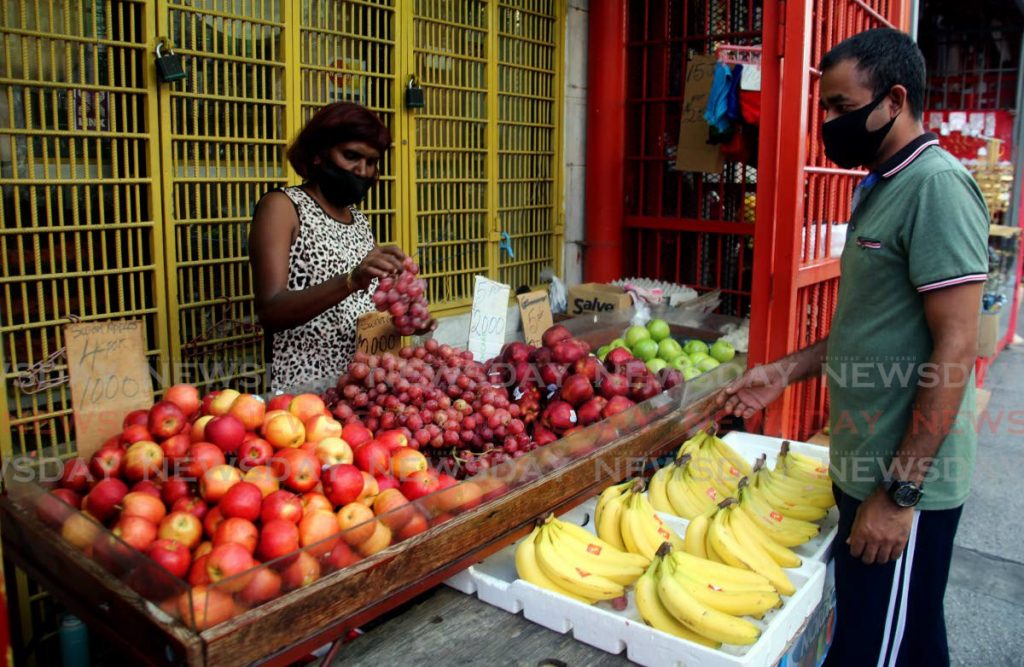Imbert: Curb your appetite for luxury foods

FINANCE Minister Colm Imbert on Tuesday implored the population to curb their penchant for imported luxury foods, which he said amounted to “hundreds of millions of dollars” being exhausted in foreign exchange.
His plea came in his wind-up of the debate on the budget, which the Senate passed by 23 votes (Government and Independent Senators) to six abstentions (Opposition.)
In his original budget speech, Imbert promised value-added tax (VAT) at 12.5 per cent on foods deemed luxury items. On Tuesday, he said such spending must be reined in.
“When you look at the food import bill, and you’ll have heard the Minister of Trade talk about it, you see we are importing billions and billions of dollars in food every year.” He rejected earlier calls by Independent Senator Amrita Deonarine to exclude apples and grapes from the imposition of VAT.
“I asked Customs and Excise to tell me what is the annual CIF value of apples and grapes imported into TT.” CIF, or "cost, insurance and freight" price, is the total price for delivering a good to the frontier of an importing country.
“You’ll be surprised, Madam Speaker. Fifty-five million dollars! So we import $55 million worth of apples and grapes, almost US$10 million. I think that is something we certainly need to control.”
Imbert said that was just one example, but there are others too. “If I was to go into all of the other foods we have mentioned such as lobster, smoked salmon, blueberries, strawberries and all these sort of things, you’d find the import cost of these items is in the hundreds of millions of dollars.”
Imbert said he was simply imposing VAT on such foods. He explained that at present, no VAT is paid on any unprocessed foodstuff, whether deemed luxury or basic.
“Unprocessed food is VAT-free. It doesn’t matter if it is lobster. It’s the same as rice or cheese. So that is a lacuna in the law as far as we are concerned, that this broad category of ‘unprocessed food’ is exempt from VAT.” Certain items should not be imported VAT-free, he said.
“The average CIF (import) price of a kilogramme of grapes is $10.20, that is $4.64 per pound,” he said. “By adding VAT, we’ll increase the cost of a pound of grapes by 58 cents.
"I don’t think that is going to prevent apples and grapes from coming into this country.” Newsday’s checks show grapes being now sold for about $30 per pound, with seedless grapes costing $35.
Imbert added, “The price of a pound of apples will go up by 43 cents.” Apples are now sold each for roughly $5 (street vendors) to $7 (supermarkets).
Another example of forex drain, he said is the expenditure of US$400 million to import 25,000 cars per year and he hoped increased taxes on smaller cars will reduce such imports.
Imbert described as “a bold step” the Government’s relinquishing of $750 million by way of raising the personal income tax allowance from $72,000 to $84,000 and by its tax exemption for earners making up to $7,000 per month.
Optimistic this would stimulate the economy by consumer spending, he said even if the Government did not rake it all back in, the allowance would help provide people with a social safety net.
Imbert was also optimistic TT could earn decent revenues this year from the energy sector. He said TT’s Molo crude oil exports earn about US$40 per barrel (being about US$1 about the price for West Texas Intermediate (WTI) oil and close to the price for Brent crude.)
He said Heritage Petroleum has a lifting cost of about US$20, so can operate profitably to earn decent revenues. The lifting cost is the cost to operate wells, equipment and facilities per barrel of oil equivalent of oil and/or natural gas extracted. In Saudi Arabia, it is US$2. Imbert was comfortable to have a deficit budget, saying major economies were doing this, rather than reduce expenditure to levels which could crash the economy.
Imbert rejected calls to devalue the TT$, pointing to currency collapse in some places when this had occurred, as he instead promised wage restraint and to hold down inflation.


Comments
"Imbert: Curb your appetite for luxury foods"